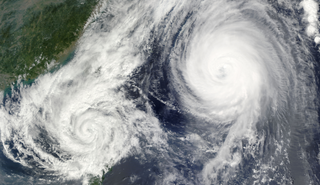University of Reading, ECMWF aim for advances in long-range weather forecasting
Scientific advances that could enable weather predictions up to a month ahead are set to benefit vulnerable communities, global industries and government bodies following the launch of a £30 million partnership involving leading meteorological institutions.
The University of Reading, in partnership with the European Centre for Medium-Range Weather Forecasts (ECMWF), the Met Office and the National Centre for Atmospheric Science (NCAS), has committed to tackling the high-risk, high-reward research challenges involved in this extended-range forecasting, by launching the Advancing the Frontiers of Earth System Prediction research programme.
A 15-year doctoral training programme, alongside multiple cycles of funding for five-year research projects, align with equivalent research intensity and focus at partner institutions, around a mutually agreed science plan. These joint efforts will provide the scientific and technical foundations to significantly improve the accuracy of weather forecasts up to four weeks ahead.
It is expected that the outcomes of this ambitious project, which represents the University’s largest ever research funding investment, will benefit national and international meteorological services, industries such as agriculture, fishing and energy, and government decision-making around the world to protect lives and livelihoods.
Pier Luigi Vidale, Professor of Climate System Science at the University of Reading and NCAS senior scientist, said: “As well as delivering trustworthy extended-range weather forecasts, underpinned by solid understanding of the physical processes governing hazardous weather worldwide, this programme will leverage the latest advances in exascale supercomputing to unleash the power of science to benefit society.”
Professor Rowan Sutton, the University of Reading’s Research Dean for Environment, also an NCAS senior scientist, said: “The broader aim of this research programme is to improve risk assessments, planning and resilience so that communities vulnerable to extreme weather will be much better prepared for what is to come. This is more important than ever because of how climate change is affecting weather in all parts of the world.
“The University has been an international leader in the science of weather forecasting for many decades. Through this new research programme, which has been developed over many years with our colleagues in the meteorological world, we are able to focus our pooled resources to make strides in physical, mathematical and computational sciences.
“Ultimately, this major new investment will enable the University to maximise the impact of our research to benefit people worldwide.”
Ten PhD places are available for students to join the Earth System Prediction Doctoral Training Programme in 2023, with research commencing in the autumn. Up to 100 placements will be funded altogether over the next 15 years.
Professor Simon Vosper, Director of Science at the Met Office, said: “The Met Office is delighted to be a partner in this exciting new research programme. Through fundamental scientific understanding and next generation high resolution modelling of severe weather, the research will ultimately improve our ability to forecast hazards further ahead, helping people to stay safe and thrive in a changing world.”

